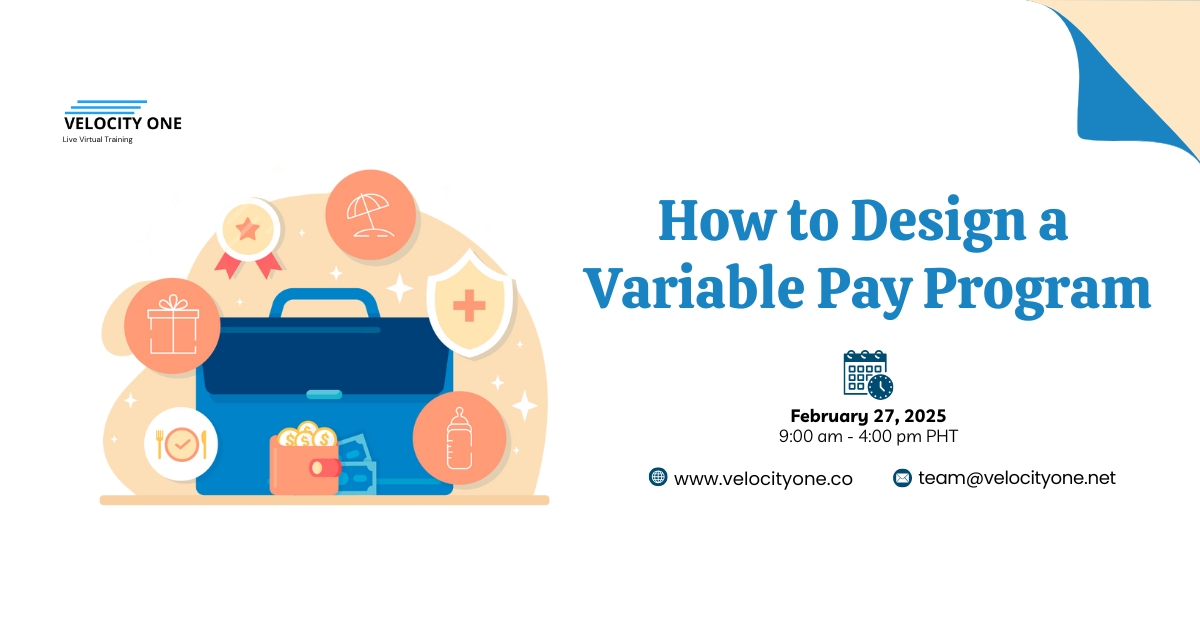TRAINING
Building Agility for the 21st Century Enterprise
How to Design a variable pay program
📅 February 27, 2025
🕘 9am – 4pm PHT
🌐 Zoom
🔗 Fee:

OVERVIEW:
Designing a competitive variable pay for businesses in the Philippines in 2025 presents some unique challenges due to economic, cultural, and market dynamics.
Economic uncertainty and inflation is the major challenge that requires a competitive variable pay design. While variable pay is typically tied to performance, companies may struggle with balancing the desire to reward high performers while managing the cost of living.
Companies will need to continuously review their pay structures to ensure they stay competitive and relevant to the market, possibly incorporating more flexible pay options like non-monetary incentives (extra time off, professional development opportunities) alongside financial rewards.
Ensuring that variable pay structures comply with local regulations while remaining attractive can be difficult. Some companies may inadvertently create a compensation structure that is too complex or non-compliant with Philippine regulations, leading to legal issues.
Join and learn how to design a competitive variable pay program for your organization.
Participants who submit and pass the required hands on exercises shall be awarded a certificate.
KEY TOPICS:
Module I
✅ Variable pay
- Definition and importance in compensation strategy
- Alignment with business goals
- Common practices in leading Philippine businesses.
- Key considerations in variable pay design — alignment with business objectives (growth, performance, retention)
- Industry standards and competitiveness
- Use of the comparative ratios for alignment with industry trends.
✅ Types of variable pay programs
- short term incentives
- long term incentives
- performance based pay
- merit pay
- recognition programs
- additional time-off, etc.
Module III
✅ Designing a competitive and effective variable pay program
- Understanding pay packages
- Balance between base and variable pay
- Communicating the plan
- Implementation and monitoring
- Best practices and pitfalls to avoid in variable pay design.
✅ Adjustments for inflation and the cost of living.
LEARNING FACILITATOR:
Maragtas SV Amante, PhD.
Dr. Maragtas S.V. Amante is Professor at the University of the Philippines School of Labor & Industrial Relations (UP SOLAIR) in Diliman, Quezon City.
From 10 February 2011 to 09 February 2017, he was the Vice President for Administration of UP, with responsibilities over strategic HR management, performance management, compensation & benefits, labor relations, utilities management and procurement.
From 2008 to 2010, he was a professor at the College of Economics and Business, Hanyang University in Seoul/Ansan, South Korea. He was U.P. SOLAIR Dean from 1998 to 2001. He has more than 25 years experience in teaching, research and consultancy work in the areas of industrial relations, economics of human resources, and compensation.
Dr. Amante graduated with a Bachelor of Arts in Economics from the University of the Philippines’ School of Economics in 1983. After graduation from the U.P., he was recruited into the staff of the University of the Philippines’ School of Labor and Industrial Relations. He was granted an Asia Foundation fellowship to pursue a master’s degree in policy economics, which he finished in 1986, from the University of Illinois in Urbana Champaign in the United States.
His interest in Japanese human resource development led him to pursue doctoral studies in Japan, where he obtained his Ph.D. degree in 1993, from Keio University in Tokyo. In 2002-03, he was a research fellow at the Seafarers’ International Research Centre (SIRC) in Cardiff University, in Wales, UK. From 2002 to 2005, Dr Amante was a consultant and facilitator with the ASEAN Secretariat and the Japan Ministry of Health, Labor and Welfare. He was closely involved in a series of meetings and dialogues held in various ASEAN capitals, to develop a common regional framework of industrial relations in East Asia. He is a research correspond-ent with the Institute of Developing Economies (IDE), Tokyo and was a visiting scholar with Shanghai Open University in June 2018.
Current research interest: emerging patterns of work, performance and pay, and new forms of employment relations.
Learn with us!
